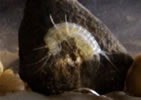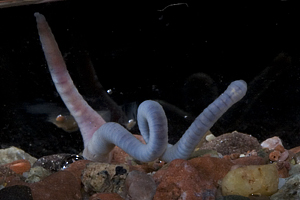Nematoda (Eelworms)
These small unsegmented worms are very common in soil, water, silt and organic debris of caves, most of them are free-living. They are best seen under a microscope due to their small size. There are many species and identification is difficult - so there are certainly many new species to be found to add to cave species lists. Allolobophora chlorotica is responsible for worm casts in Otter Hole. Some are to be found deep in caves.
Nematomorpha (Horsehair worms)
The Nematomorpha have long brown coloured bodies and appear like living pieces of horsehair, hence the name. They are common in surface rivers and streams but have rarely been recorded underground. The different species are difficult to identify.
Annelida (Segmented worms)
These segmented worms (e.g. earthworm) are often abundant in caves, groundwaters and sediments living in soil. They ingest (‘eat’) mud and extract nutrients from it. Allolobophora chlorotica is responsible for worm casts in Otter Hole. Some are to be found deep in caves but all those found in caves also live in surface soils. Most of the time they will be hidden in soil and therefore hidden from view, so their importance underground could be underestimated.
In sea caves sedentary polychaete (e.g. ragworms) worms are common.
|
Segmented worm in small stream, Ogof Fynnon Ddu 1 |
Tubifex sp. worms ingest sediments and gain nutrition by selectively digesting bacteria from the mud and absorbing molecules through the body wall. The worms can survive without oxygen for months, and can survive in areas so heavily polluted with organic matter that almost no other species can survive. T. tubifex can survive drought and food shortage by forming a protective cyst and lowering its metabolic rate. Distinguishing between species is difficult because the reproductive organs, commonly used in species identification, are reabsorbed after mating.
Hirudinea (Leeches)
The leeches are a sub-group of the Annelida. The British species are found in freshwater and include both predatory and parasitic forms, the latter sucking the blood of water birds and mammals. Only one species, the now rare Medicinal Leech Hirudo medicinalis, is capable of penetrating human skin. |


